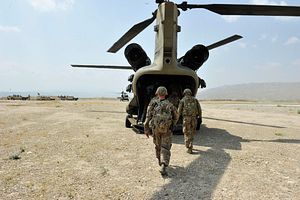The plan was to be out of Afghanistan by now, but reality rarely matches timetables. Now, NATO is looking to maintain troop levels through next year and extend its funding of the Afghan security forces to 2020.
In 2011, the plan was to steadily drawdown U.S. and NATO forces in Afghanistan and hand over the mission in 2014 to the Afghans. While U.S. and NATO troops managed to shift into a supporting role and a new mission with a new name took over in 2015 the timetable continues to stretch along. In May 2014, U.S. President Barack Obama stood in the White House’s Rose Garden and announced that by the end of 2016, only a vestigial force of Americans would remain in Afghanistan. A year and a half later, the plan changed again. In October 2015, Obama announced that the U.S. would maintain the 9,800 U.S. forces currently in country through “most of 2016” and 5,500 through 2017.
According to Reuters, NATO says it will have about 12,000 troops in Afghanistan through 2016 — 7,000 U.S. forces and 5,000 from NATO and non-NATO partner nations.
NATO Secretary-General Jens Stoltenberg, at a meeting of NATO foreign ministers, reiterated why NATO must remain engaged in Afghanistan, saying, “We are in Afghanistan to prevent that Afghanistan again becomes a safe haven for international terrorists … that is also in our security interest to make sure that that doesn’t happen,”
At the NATO summit in 2012, members and allies alike pledged to give $1 billion a year, plus the over $4 billion the United States gives, to support the Afghan security services. That commitment, and budget, to support the Afghans was agreed upon through 2017. Stoltenberg wants a new pledge to finance the Afghan security forces after 2017. Those discussions are already beginning; Stoltenberg said that “we will start to address that at our Foreign Ministerial meeting and then hopefully make the final decision at our summit in July next year.”
U.S. Ambassador to NATO Douglas E. Lute said that “Afghanistan remains unfinished business.” TOLOnews quoted Lute as saying that “it’s going to require a long-term effort, but the good news is today we have a much more willing and a much more capable Afghan partner than we had in the past.”
The war in Afghanistan (or rather, this phase of war in the country), is stretching into its 15th year. Afghanistan remains a strategic conundrum. Throwing more money at the problem may not solve it, but neither will walking away.
































